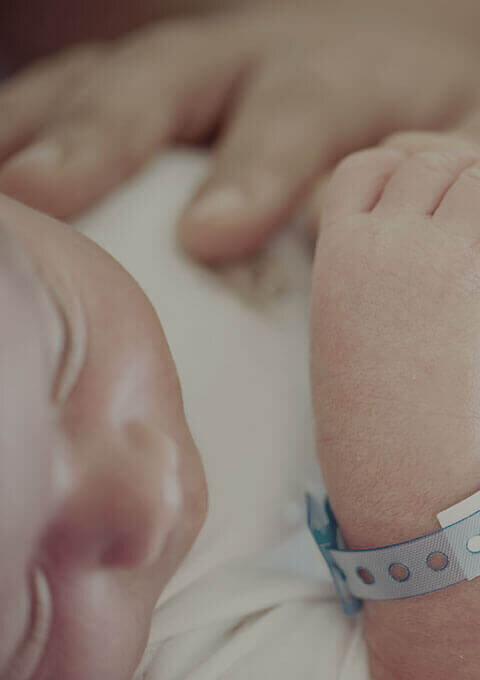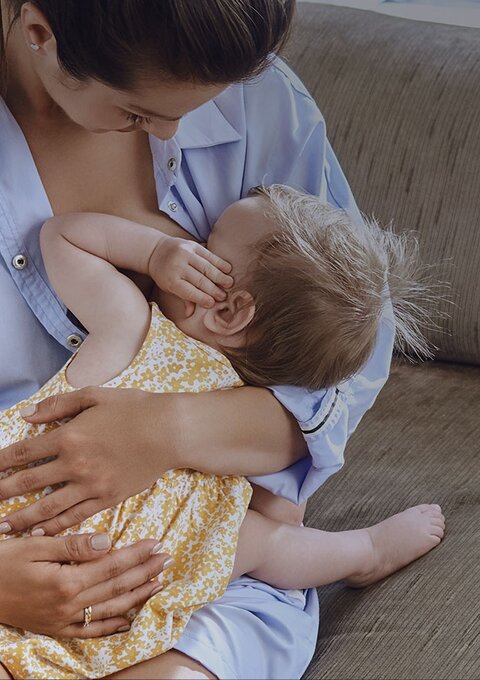The labour is over! Congratulations! It was really hard and now you need some time to regain your strength and good condition. This time is called puerperium. Read more to learn what is going on with your body, what you should pay attention to and what things may surprise you.
It is widely accepted across different cultures that after the delivery woman needs to rest. The baby is taken care of by other women, who take over all the duties and only bring the little one to its mum for feeding, cuddling and sleeping together. This really makes sense. Pregnancy and labour are exhausting, and the puerperium, i.e. the first 6-8 weeks after delivery is to be the time of wound healing and recovery.
Uterus shrinking, i.e. its return to a normal size and weight, is accompanied by contractions. The puerperium contractions may be quite painful, they intensify when you breastfeed and when your body produces more oxytocin.
You may try to alleviate the pain by employing the breathing techniques you have learnt at the antenatal classes. Emptying your bladder is also important to make the contractions less painful, it is therefore recommended to drink a lot of fluids and not to postpone urination in the puerperium.
After a natural childbirth, even if you avoided incision and stitches, the perineum is swollen and painful. You need to take proper care of the stitches and your intimate areas, as the body is weak after the labour and more vulnerable to infections. To alleviate pain and make seating easier, you may use special donut cushions with a central hole or an inflatable swimming ring.
This is a natural physiological consequence of the labour. It appears due to uterus shrinking, both after natural childbirth and the C-section. In the beginning it is similar to abundant menstrual period, then it turns brownish, and finally it becomes colourless. Postpartum discharge may persist for 4-6 weeks after childbirth.
The lactation may be a bit postponed after the C-section, but it still occurs! The body and the breasts have been preparing for the breastfeeding of the baby much earlier.
Breastfeeding after a C-section, Read more...
Irrespective of the labour course, the beginnings may be not easy and problem-free. The baby may not want to grasp the breast, you may have problems with your nipples, and the breast fullness is almost sure to occur about four days after the delivery. These problems may sure by overcome! Learn in advance how to tackle them and remember that lactation consultants are meant to help you.
Breastfeeding troubleshooting, Read more...
The first days after the C-section are characterized by problems resulting from the surgical procedure requiring opening of the abdominal wall. A woman feels pain around the surgical wound, it increases with every movement and every use of the abdominal muscles. For the first few hours following the surgery a women must be lying flat, without raising her head. She may experience general weakness, headache, anaesthetic complications.
They are often a problem at the end of the pregnancy, and if not then, they may appear after childbirth as a result of pushing. Swelling of the veins around anus may be reduced by using special creams and ointments, and after the perineum is healed hip baths with oak bark can be used.
Constipations, pain and difficulties with urinating are unfortunately quite common in the first days postpartum. To avoid constipations try to eat fibre-rich products, be active and, first and foremost, stand on your feet again as soon as possible. After a natural labour the muscles are strained and lacerations of genital organs may appear. The first urinating may be facilitated by the sound of running tap water or a shower.
Due to overloading of the urogenital diaphragm (Kegel muscles) during pregnancy and childbirth, some women may experience stress incontinence. About 2-3 months are necessary for the muscles to get back to their original flexibility. Exercising may be helpful. This is why it is a good idea to train the Kegel muscles, i.e. the pelvic floor muscles, right from the first day after the childbirth, and even during pregnancy. (You may learn more, by reading this article.)
In the first days after delivery a woman's body produces more adrenaline, and this helps her to take proper care of the newborn, to get up at night, to change nappies. However, this is soon over, and the body is gripped by fatigue. This is well justified, considering what you have been through and what you must face each day. Therefore, it is time to change your priorities, share your home duties, and use every moment the baby is sleeping or in the care of someone else, to rest or get some sleep.
It is needles to say how important it is, this is just to remind you what to do:
always wash your hands before and after changing a maternity pad;
always wash your private parts after urinating or passing stool;
use soft or baby soap or an intimate hygiene gel you had used before pregnancy;
dry the perineum after washing with a disposable towel;
expose the perineum to the air - this facilitates healing;
do not lift heavy things - this is an important recommendation - your muscles may get strained and not get back to their original flexibility, and this may cause reproductive organ prolapse and urinary incontinence, or even wound dehiscence after the C-section.
For the healing process to go smoothly, the wounds and sutures (perineum and the C-section) should be kept clean and dry. You may sometimes use an antiseptic agent to disinfect them. Wear breathable underwear that does not irritate these sensitive areas. While choosing maternity briefs, make sure they are made of proper fabric and the elastic band does not rub against the wound. The best choice are breathable, thin and washable maternity briefs.
The biggest surprise is usually the clash of reality with your expectations. When you were pregnant and later on at the hospital, you were dreaming about the moment when you come back home with your baby, watch him or her with your partner, be eternally happy and feel overwhelmed with love to each other. In fact, you are tired, you have no time, the baby cries and you do not know what it wants. The relationship with your partner has shifted dramatically, you need to settle things between you in this new situation and be prepared for possible conflicts and misunderstandings. You experience a real hormone storm, you can laugh and cry a moment later, you dislike your aching and changed body, and you reproach yourself for feeling nervous at hearing your baby cry.
Be careful! Your mood after childbirth is a serious matter. Although the baby blues, experienced by 50-70% of women after childbirth is normal, the postpartum depression requires professional help.
You will become a mum any day now. You can't wait, but you are also terrified of the vision of long and difficult labour, particularly if you are expecting your first child. Knowledge is your best ally. Find out what is ...
Winter has come with its beautiful snowy landscapes, but, unfortunately, also with awful weather and wet feet. Disease does not discriminate and everybody can go down with cold. How to deal with it when you are pregnant?
There are some things you do not talk loud and often about, however, they are worth knowing when you are pregnant. Here you can read why a pregnancy favors intimate infections, whether they can pose a risk to your baby, and ...
Are you getting ready for childbirth? Are you planning a natural birth, but you know from other women's experience that is not always possible? Or maybe you already have had a date for a C-section scheduled due to obstetric ...

